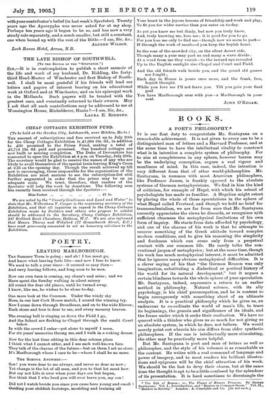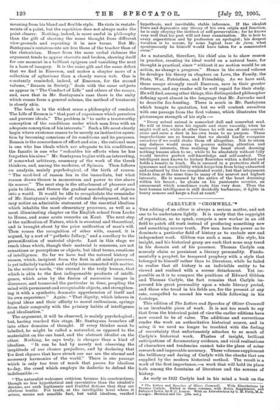A POET'S PHILOSOPHY.* IT is our first duty to congratulate
Mr. Santayana on a remarkable achievement. It is not given to every one to be a distinguished man of letters and a Harvard Professor, and at the same time to have the intellectual vitality to construct what is in intention a complete system of philosophy. For to aim at completeness in any sphere, however barren may be the underlying conception, argues a real vigour and manliness of mind. In this case, indeed, the intention is very different from that of other world-philosophies. Mr. Santayana, in common with most American philosophers, like Professor James, is frankly opposed to the absolute systems of German metaphysicians. We find in him the kind of criticism, for example of Hegel, with which his school of psychologists has made us familiar. A Hegelian might retort by placing the whole of these speculations in the sphere of what Hegel called Yerstand, and though we hold no brief for transcendentalism, we are far from sure that Mr. Santayana correctly appreciates the views he discards, or recognises Nath sufficient clearness the metaphysical limitations of his own form of inquiry. He starts from data afforded by psychology, and one of the charms of his work is that he attempts to recover something of the Greek attitude toward complex modern conditions, and to give his reasoning the simplicity and freshness which can come only from a perpetual contact with our common life. He rarely talks the con- ventional jargon of metaphysics ; but at the same time, though his work has much metaphysical interest, it must be admitted that he ignores many obvious metaphysical difficulties. It is a clever saying of his that " the German Reason was only imagination, substituting a dialectical or poetical history of the world for its natural development," but it argues a certain blindness towards the whole sphere of pure speculation. Mr. Santayana, indeed, represents a return to an earlier method in philosophy. Natural science, with its ally psychology, is his chief preoccupation, and be is content to begin courageously with something short of an ultimate analysis. It is a practical philosophy which he gives us, an endeavour to co-ordinate the world of man's life, to trace its beginnings, the genesis and significance of its ideals, and the forms under which it seeks their realisation. We have no quarrel with a thinker who gives us so much for not giving us an absolute system, in which he does not believe. We would merely point out wherein his aim differs from older synthetic philosophers. If the one is intellectually more stimulating, the other may be practically more helpful.
But Mr. Santayana is poet and man of letters as well as philosopher, and the style of his volumes is as remarkable as the content. He writes with a real command- of language and power of imagery, and to most readers his brilliant illustra- tions and epigrams will be the chief attraction of his work. We should be the last to deny their charm, but at the same time the thought is apt to be a little confused by the splendour of its presentation. It is hard sometimes to disentangle the • The Life of Reason ; or, The Phases of Human Progress. By George Santayana. Vol. I., Introduction, and Reason in Common Sense." Vol. IL, Reason in Society." Loudon A. Constable and Co. [5e. net each.]
point clearer. Nothing, indeed, is more useful in philosophy than the gift of showing the same thought from different view-grounds and repeating it in new terms. But Mr. Santayana's restatements are less those of the teacher than of the rhetorician. Hence from the mere verbal richness the argument tends to appear staccato and broken, showing itself for one moment in a brilliant epigram and vanishing the next in a haze of imagery. It is the same gift and the same defect that we find in Emerson, and makes a chapter more of a collection of aphorisms than a closely woven web. One is constantly reminded, indeed, of Emerson, for the second volume, " Reason in Society," deals with the same subjects as appear in " The Conduct of Life " and others of the essays, and, save that in Mr. Santayana's case there is the unity which comes from a general scheme, the method of treatment is closely akin.
The book is in the widest sense a philosophy of conduct. The Life of Reason is " that part of experience which perceives and pursues ideals." The problem is " to unite a trustworthy conception of the conditions under which man lives with an adequate conception of his interests." Such a life must clearly begin where existence ceases to be merely an instinctive opera- tion by becoming conscious of its conditions and its purposes. Reason is the concordance of effort and aim ; the rational man is one who has ideals which are adequate to his conditions ; the fanatic is one who " redoubles his efforts when he has forgotten his aims." Mr. Santayana begins with an interesting, if somewhat arbitrary, summary of the work of the Greek thinkers, and, among the moderns, of Spinoza. Then follows an analysis, mainly psychological, of the birth of reason.
" The seed-bed of reason lies in the immediate, but what reason draws thence is momentum and power to rise above its source." The next step is the attachment of pleasure and pain to ideas, and thence the gradual marshalling of objects into a world. It would be idle to recapitulate the remainder of Mr. Santayana's analysis of rational development, but we may notice an admirable statement of the essential idealism which inhabits the most elementary processes, as well as a most illuminating chapter on the English school from Locke to Hume, and some acute remarks on Kant. The next step is the unification of Nature, which is eventual and theoretical, and is brought about by the prior unification' of man's will.
Then comes the recognition of other wills, caused, it is argued, by a sort of " pathetic fallacy," and a corollary to the personification of material objects. Last in this stage we reach ideas which, though their material is sensuous, are not sensations or perceptions or objects, but ideal terms, creations of intelligence. So far we have had the natural history of reason, which, incipient from the first in all mind processes, is yet infinitely 'variable and subtly interconnected with matter.
In the writer's words, " the eternal is the truly human, that which is akin to the first indispensable products of intelli- gence, which arise by the fusion of successive images in discourse, and transcend the particular in time, peopling the mind with permanent and recognisable objects, and strengthen- ing it with, a synthetic, dramatic apprehension of itself and its own experience." Again : " That dignity, which inheres in logical ideas and their affinity to moral enthusiasm, springs from their congruity with the prim'ary habits of intelligence and idealisation."
, The argument, it will be observed, is mainly psychological ; but, having reached this stage, Mr. Santayana branches off into other domains of thought. If every thinker must be labelled, he might be called a naturalist, as opposed to the materialist on the one hand, and the abstract idealist on the other. Nothing, he says truly, is cheaper than a kind of idealism. " It can be bad by merely not observing the ineptitude of our chance prejudices, and by declaring that the first rhymes that have struck our ear are the eternal and necessary harmonies of the world." There is one passage
which is only too true of much that passes for idealism to-day, the creed which employs its dialectic to defend the indefensible :—• " The naturalist welcomes criticism because his constructions, though no less hypothetical and speculative than the idealist's dreams, are such legitimate and fruitful fictions that they are 'obvious truths. For truth, at the intelligible level where it arises, means not sensible fact, but valid idealism, verified hypothesis, and inevitable, stable inference. If the idealist fears and deprecates any theory of his own origin and function, he is only obeying the instinct of self-preservation; for he knows very well that his past will not bear examination. He is heir to every superstition and by profession an apologist; his deepest vocation is to rescue, by some logical tour de force, what spontaneously he himself would have taken for a consecrated error."
As a naturalist, therefore, his chief aim is to show reason in practice, creating its ideal world on a natural basis, for thought is practical, since " without it no motion would be an action, no change-a progress." Hence in the second volume he develops his theory in chapters on Love, the Family, the State, War, Patriotism, and Friendship. As we have said, these essays strongly recall Emerson, save in their greater coherence, and any reader will be well repaid for their study. He will find, among other things, this distinguished philosopher defining sport almost in the language that Mr. Jorrocks used to describe fox-hunting. There is much in Mr. Santayana which tempts to quotation, but we will content ourselves with one passage from the first volume, which illustrates the picturesque strength of his style :— " Every actual animal is somewhat dull and somewhat mad. He will at times miss his signals and stare vacantly, when he might well act, while at other times he will run off into convul- sions and raise a dust in his own brain to no purpose. These imperfections are so human that we should hardly recognise ourselves if we could shake them off altogether. Not to retain any dulness would mean to possess untiring attention and universal interests, thus realising the boast about deeming nothing human alien to us ; while to be absolutely without folly would involve perfect self-knowledge and self-control. The intelligent man known to history flourishes within a dullard and holds a lunatic in leash. He is encased in a protective shell of ignorance and insensibility which keeps him from being exhausted and confused by this too complicated world ; but that integument blinds him at the same time to many of his nearest and highest interests. He is amused by the antics of the beast dreaming within his breast ; he gloats on his passionate reveries, an amusement which sometimes costs him very dear. Thus the best human intelligence is still decidedly barbarous; it fights in heavy armour and keeps a fool at court."



































 Previous page
Previous page